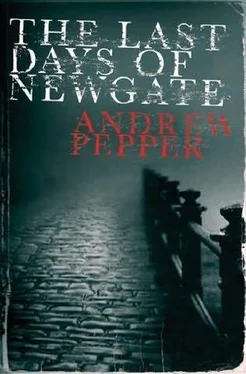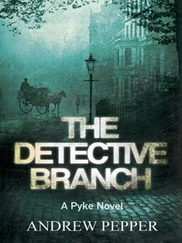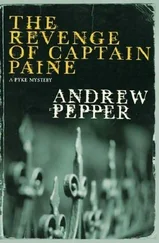Andrew Pepper - The Last Days of Newgate
Здесь есть возможность читать онлайн «Andrew Pepper - The Last Days of Newgate» весь текст электронной книги совершенно бесплатно (целиком полную версию без сокращений). В некоторых случаях можно слушать аудио, скачать через торрент в формате fb2 и присутствует краткое содержание. Жанр: Исторический детектив, на английском языке. Описание произведения, (предисловие) а так же отзывы посетителей доступны на портале библиотеки ЛибКат.
- Название:The Last Days of Newgate
- Автор:
- Жанр:
- Год:неизвестен
- ISBN:нет данных
- Рейтинг книги:4 / 5. Голосов: 1
-
Избранное:Добавить в избранное
- Отзывы:
-
Ваша оценка:
- 80
- 1
- 2
- 3
- 4
- 5
The Last Days of Newgate: краткое содержание, описание и аннотация
Предлагаем к чтению аннотацию, описание, краткое содержание или предисловие (зависит от того, что написал сам автор книги «The Last Days of Newgate»). Если вы не нашли необходимую информацию о книге — напишите в комментариях, мы постараемся отыскать её.
The Last Days of Newgate — читать онлайн бесплатно полную книгу (весь текст) целиком
Ниже представлен текст книги, разбитый по страницам. Система сохранения места последней прочитанной страницы, позволяет с удобством читать онлайн бесплатно книгу «The Last Days of Newgate», без необходимости каждый раз заново искать на чём Вы остановились. Поставьте закладку, и сможете в любой момент перейти на страницу, на которой закончили чтение.
Интервал:
Закладка:
The card game was taking place in the cellar beneath the taproom. It was a stuffy, low-ceilinged room, and even though it was July, a turf fire smouldered in the grate. Above them, in the taproom itself, the fiddle-playing had started up and the resulting foot-stomping caused flecks of dust and plaster to rain down on the makeshift card table. On the floor was spread a generous layer of butcher’s-shop sawdust. As he introduced the other two players, Archie Tait, a former pugilist who owned a small whisky distillery, and Bill Campbell, who taught moral philosophy at the Academical Institution, Arnold himself took no notice of the disturbance. Lining the walls around the cramped room were a motley assortment of hangers-on: shipyard builders and brick-field labourers in working clothes, with dirty fingernails, drinking Dublin stout from chipped pots, staring with silent envy at the small pile of money gathered on the table.
As he sat down on a wooden chair, Pyke glanced up at the shaking ceiling and said, ‘Dancing without women.’ No one reciprocated his smile.
‘You’ll excuse our unfamiliarity with your more sophisticated tastes,’ Arnold said, pouring himself a fresh glass of whisky. ‘We’re hard-working folk, not necessarily inured to the effects of alcohol like the rest of Ireland. But you see, tomorrow is a holiday, a celebration to commemorate smashing the papists, and so we’re giving our moral diligence a rest for the night.’ With feigned sentiment, he held up his whisky glass. ‘A toast to King Billy.’ A murmur of approval rippled around the room, followed by a chink of ale pots. Pyke left his own glass on the table.
‘Ye don’t care to join us in a drink?’ The ex-pugilist stared at him fiercely. He was an ugly man made uglier by the visible scars of his former profession.
Pyke picked up his glass and poured its contents down his open throat. That seemed to satisfy the gathered crowd, if not the pugilist.
Campbell laughed nervously. He was unctuous but appeasing. ‘So what do you think of our wee town, Mr Hawkes?’
Pyke told him that, so far, he’d found it cold, wet and dreary. Campbell smiled genially but Tait and Arnold met his flippancy with stony faces.
‘It’s a liberal Presbyterian town,’ Campbell said, ‘or at least it used to be, back when people read Paine and Franklin as avidly as they did Knox and Calvin. Of course, the Anglicans always held the purse-strings, still do’ — he glanced nervously at Arnold — ‘but for a while, at least, people were calling us the northern Athens, with their tongues only half in their cheek. These are darker times, though. The good Reverend Henry Cooke will soon have us dressing in sackcloth and reading nothing but the Good Book. Wouldn’t that be a good thing for all of us, John?’ His tone dripped with sarcasm.
Arnold shrugged and picked up the playing cards. ‘As long as the mills continue to make a profit and the papists are kept on the rack, the Reverend Cooke can say or do what he likes.’ He turned to Pyke and said, ‘We were playing Primero. I’ll presume ye have enough money to cover whatever debts you accrue.’ He cracked his knuckles and began to deal the cards. ‘As you might readily believe, things could turn ugly for folk who canna settle their debts.’
Pyke lost steadily over the course of the following hour but limited his losses to a few pounds by betting frugally and folding often. Quickly, the other players came to regard him as an irrelevance. Even Arnold seemed to relax his guard.
They talked in clipped sentences about people they knew in a way that was designed to exclude him. When it was his turn to deal, Pyke used the opportunity to slip himself an additional card, the six of clubs, which he dropped into his lap and, later, shunted up his sleeve. Even the onlookers had ceased to notice him.
Now slightly drunk, Arnold was rhapsodising about the prosperity his new mill would bring the town.
‘I saw some of that prosperity on the streets surrounding the mill.’
‘Did ye now?’ Arnold eyed him cautiously.
‘More cripples than you could shake a stick at.’ He held the mill owner’s stare.
Arnold smiled, not rising to the bait. ‘I suppose your own labourers don’t suffer from leg injuries or chest diseases, Mr Hawkes?’
This time Pyke returned the smile.
‘Which part of Lancashire did you say you were from?’ Campbell asked.
‘Bury.’ Pyke waited for a moment. ‘The town that gave us our fine Home Secretary.’ He fixed his gaze on Arnold.
‘That would be a matter of personal opinion,’ Arnold said, folding his arms.
‘What? That Peel and myself share a common heritage?’
‘That he’s a fine man,’ Arnold replied, through gritted teeth.
‘Oh?’ Pyke tried to sound appropriately bemused.
‘He did a good enough job while he was here, I’ll give him that.’ Arnold filled up his whisky glass. ‘Makes it harder to believe he could turn papist and live with himself.’
‘You knew him when he was the Chief Secretary here?’
Arnold’s eyes narrowed. ‘Of him, aye.’
‘Then you must have known a friend of mine who worked for him. Still does, I think.’
‘And who might that be?’
‘Fitzroy Tilling.’
But Arnold’s stare gave nothing at all away. ‘Aye, I know the man.’
‘Well or not?’
‘He’s a friend a’ yours, ye say?’
‘We haven’t spoken to one another in a while.’
‘I never much warmed to the man myself.’ Arnold took a sip of whisky and tossed a guinea into the pot. ‘Any of you interested in playin’ a game of cards?’ he said, this time avoiding Pyke’s stare.
Earlier in the day, Pyke had considered holding a knife to Arnold’s throat and asking him about his relationship with Tilling. On reflection, though, he had ruled out such an idea. From experience, he knew that people didn’t necessarily provide truthful answers when confronted with physical violence.
It had been his plan to see how Arnold reacted when Tilling’s name was mentioned. Now, though, he felt confused and disappointed. At the very least, he had hoped that Arnold might be thrown off kilter, but the man had responded as though he barely knew him. Pyke took a moment to organise his thoughts. He knew that Tilling had once acted as Peel’s eyes and ears in Ulster. He had been told by Mary Johnson, in London, that Davy Magennis had been drafted into the Royal Irish Constabulary because his father, Andrew, had asked Arnold to recommend him. Mary had insisted that, on the strength of this recommendation, someone had travelled to Armagh, in person, to offer Magennis a position in the new force. For some reason, perhaps because of Tilling’s reaction to his mentioning Davy Magennis’s name, Pyke had assumed that Tilling was the person who had travelled to Armagh. Now, though, he was not so sure. On the evidence of Arnold’s tepid response, it didn’t seem the two men were even on friendly terms.
Pyke wondered whether Tilling was as important to his investigation as he wanted to believe.
For the following two rounds, Pyke waited in vain for another six, to add to the one he had hidden up his sleeve. He betted moderately and lost unspectacularly. The game was a little under two hours old when Pyke dealt himself a hand that included the six of hearts and the six of diamonds. Together with the hidden card, it gave him a very strong hand. Seated to his left, Arnold opened the betting and pushed five guineas into the pot.
Meanwhile, Pyke had steered the conversation on to the subject of the marches.
‘The rank and file will march tomorrow, in defiance of what the Grand Master has instructed them to do,’ Campbell muttered, as though he did not approve.
Arnold shook his head vigorously. ‘I’m giving my workers a holiday. Good luck to ’em if they decide to march. Fact is, I’ve told ’em that if they can walk, then they should bloody well march.’ That drew an approving murmur from the gathering. Then Arnold added, mostly for Pyke’s benefit, ‘You’ll see blood spilled tomorrow, that’s for sure.’
Читать дальшеИнтервал:
Закладка:
Похожие книги на «The Last Days of Newgate»
Представляем Вашему вниманию похожие книги на «The Last Days of Newgate» списком для выбора. Мы отобрали схожую по названию и смыслу литературу в надежде предоставить читателям больше вариантов отыскать новые, интересные, ещё непрочитанные произведения.
Обсуждение, отзывы о книге «The Last Days of Newgate» и просто собственные мнения читателей. Оставьте ваши комментарии, напишите, что Вы думаете о произведении, его смысле или главных героях. Укажите что конкретно понравилось, а что нет, и почему Вы так считаете.












